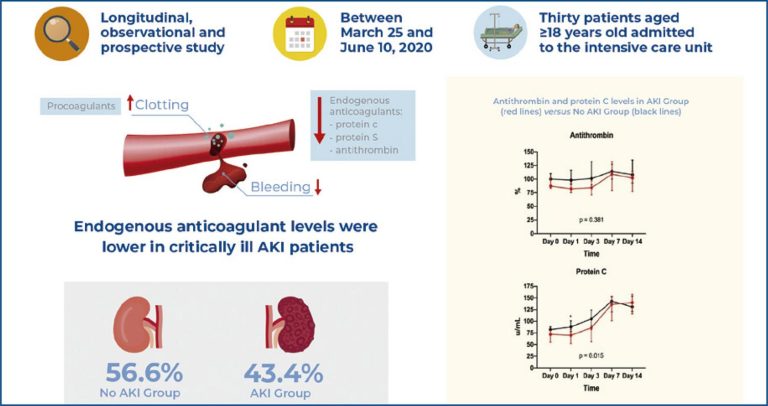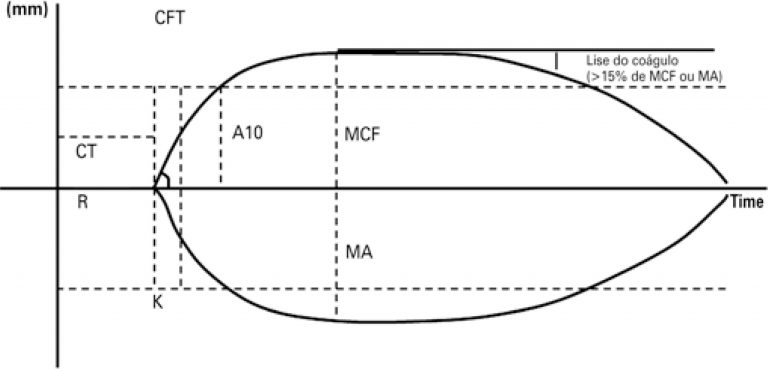30/Aug/2023
COVID-19-associated coagulopathy and acute kidney injury in critically ill patients
DOI: 10.31744/einstein_journal/2023AO0119
Highlights 43.4% of the cohort developed acute kidney injury. D-dimer and fibrinogen levels were high in both groups. Rotational thromboelastometry data were similar between groups. Serum levels of antithrombin activity and protein C were lower in patients who developed acute kidney injury. Objective The incidence of thrombotic events and acute kidney injury is high in critically ill patients with COVID-19. We aimed to evaluate and compare the coagulation profiles of patients with COVID-19 developing acute kidney injury versus those who […]
Keywords: Acute kidney injury; Blood coagulation; Coronavirus infections; COVID-19; Intensive care units; SARS-CoV-2; Thrombosis
22/Jan/2020
Association between hypocalcemia and rivaroxaban in coagulation disorders: a case report
einstein (São Paulo). 22/Jan/2020;18:eRC4819.
View Article22/Jan/2020
Association between hypocalcemia and rivaroxaban in coagulation disorders: a case report
DOI: 10.31744/einstein_journal/2020RC4819
ABSTRACT We describe a patient with tertiary hyperparathyroidism with history of three episodes of deep vein thrombosis and on rivaroxaban. The patient underwent a subtotal parathyroidectomy, developing cervical hematoma with airway compression. Therefore, emergency surgical decompression was necessary. Later, on the ninth postoperative day, the serum ionized calcium levels were low. Medical team knowledge about preexisting diseases and their implication in the coagulation state are essential conditions to reduce morbidity and mortality of surgeries. However, no reports were found in […]
Keywords: Blood coagulation; Hematoma; Parathyroidectomy; Rivaroxaban/adverse effects
04/Apr/2017
The role of thromboelastometry in the assessment and treatment of coagulopathy in liver transplant patients
DOI: 10.1590/S1679-45082017MD3903
ABSTRACT Perioperative monitoring of coagulation is vital to assess bleeding risks, diagnose deficiencies associated with hemorrhage, and guide hemostatic therapy in major surgical procedures, such as liver transplantation. Routine static tests demand long turnaround time and do not assess platelet function; they are determined on plasma at a standard temperature of 37°C; hence these tests are ill-suited for intraoperative use. In contrast, methods which evaluate the viscoelastic properties of whole blood, such as thromboelastogram and rotational thromboelastometry, provide rapid qualitative […]
Keywords: Blood coagulation; Blood transfusion; Hemorrhage; Liver transplantation; Thrombelastography; Transplantation
01/Jul/2014
Personalized medicine and the clinical laboratory
DOI: 10.1590/S1679-45082014RW2859
Personalized medicine is the use of biomarkers, most of them molecular markers, for detection of specific genetic traits to guide various approaches for preventing and treating different conditions. The identification of several genes related to heredity, oncology and infectious diseases lead to the detection of genetic polymorphisms that are involved not only in different clinical progression of these diseases but also in variations in treatment response. Currently, it is possible to detect these polymorphisms using several methodologies: detection of single […]
Keywords: Anticoagulants; Blood coagulation; DNA; Genetics; Hepatitis C; Individualized medicine; medical; Molecular medicine; Neoplasms; Pharmacogenetics



